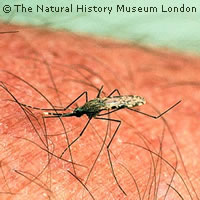EU grid initiative identifies promising drug compounds to fight malaria
An EU funded initiative has just completed a round of virtual screening to identify the most promising drug compounds for fighting malaria. Between 1 October 2006 and 31 January 2007, the WISDOM (World-wide In Silico Docking On Malaria) project analysed on average 80,000 compounds an hour using the Enabling Grids for E-sciencE (EGEE) infrastructure. The compounds were screened using in silico docking techniques, whereby researchers computed the probability that potential drugs will 'dock' or interact with a target protein of the malaria parasite. A total of 140 million docking arrangements between drug compounds and target proteins were processed. Over the 10 weeks of screening, the project used the equivalent of 420 years of a single computer's computing power. Up to 5,000 computers were used simultaneously in 27 countries, generating a total of 2,000 gigabytes of useful data. Through virtual screening, researchers can rule out the vast majority of potential drugs, so that they can concentrate on the most promising compounds in laboratory tests. This speeds up the screening process and reduces the cost of new drug development to treat diseases such as malaria. According to Doman Kim, from the Jeonnam National University in Korea, one of the project partners, the impact of WISDOM goes beyond malaria. 'The method developed can be extended to all diseases and this opens exciting industrial perspectives. Until now, the search for new drugs in the academic sector was done at a relatively small scale, whereas the WISDOM approach allows a systematic inquiry of all the potentially interesting molecules,' he said. This is not the first time that WISDOM has conducted such a large scale virtual screening. In 2005, researchers docked over 41 million compounds and researchers identified some 5,000 interesting compounds, from which they found three interesting families of molecules that could be effective against the malaria parasite. Laboratories at the University of Modena, the Institute of Biomedical Technology (CNR-ITB), both in Italy, and the French National Scientific Research Centre (CNRS) in France are now carrying out more advanced studies of the molecules using molecular dynamics. Following those studies, the enzymology laboratory of the Jeonnam National University in Korea will test them in vitro.



